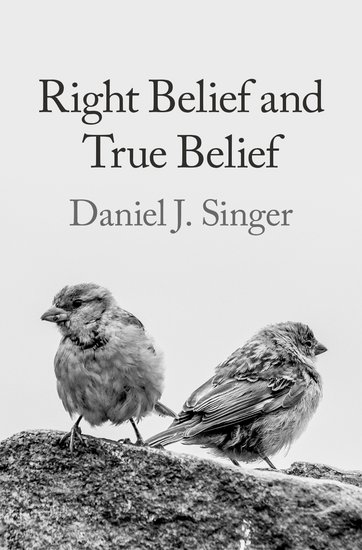Research
My research is largely organized around the question of what we should believe, both as individuals and as groups, and how diversity, network structures, and expertise affects this. This research touches on many topics in epistemology (including traditional, formal, and social epistemology), the nature of normativity in ethics and epistemology, and social philosophy with particular emphases on diversity and polarization. Below are some short descriptions of my major research projects. For more information about my research, see my CV or contact me.
Traditional Epistemology
In my book Right Belief and True Belief (Oxford University Press, Oct. 2023), I argue that we should conceive of the central epistemic question as the question of what we should believe. I then argue that we can approach that question in a way that mirrors how normative ethicists approach the question of what we should do. The first chapter is devoted to the methodology, but most of the book is dedicated to defending a truth-loving consequentialist answer to the question of what we should believe. The central claim of the truth-loving epistemic consequentialist is that what we should believe (and what credences we should have) can be understood in a simple consequentialist way in terms of what conduces to us having the most accurate picture of the world. The view can straight-forwardly vindicate the popular intuition that epistemic norms are about getting true belief and avoiding false belief, and it coheres well with how scientists, engineers, statisticians, etc. (i.e. those who are particularly rigorous in regulating their own beliefs) think about what we should believe. Many authors have flirted with truth-based consequentialist approaches to epistemic norms before, but most of those have abandoned the approach in response to a number of persuasive objections, most famously including trade-off and counting-blades-of-grass objections. In Right Belief and True Belief, I defend the simple truth-based consequentialist account of epistemic norms from these objections and argue that the truth-loving epistemic consequentialist picture can undergird a broader truth-centric approach to epistemology. Some parts of the book build off previous work (such as my 2018 “How to be an Epistemic Consequentialist” in Philosophical Quarterly and my 2018 “Permissible Epistemic Trade-offs” in The Australasian Journal of Philosophy), but the vast majority of the book is new.
In addition to epistemic consequentialism, I also have particular research interests in epistemology around:
- The metaethics of epistemology
- The value of epistemology
- The relationship between social, formal, and traditional epistemology
- The connection between epistemology and other fields
Selected Related Publications:
-
Right Belief and True Belief (2023, Oxford University Press)
-
“How to be an Epistemic Consequentialist” (2018, Philosophical Quarterly)
-
“Demoting Promoting Objections to Epistemic Consequentialism” (2019, Philosophical Issues)
-
“Permissible Epistemic Trade-offs” (2018, the Australasian Journal of Philosophy)
-
“Constitutivist Grounding Explanations and Naturalism” (under review)
Social Philosophy: Diversity, Polarization, and Social Networks
A second major part of my research focuses on diversity, expertise, and polarization and the effects they can have on groups. I approach this research using minimal models of diversity, polarization, and expertise in group problem solving and deliberation (usually instantiated in agent-based computer models).
Most of my work on these topics is done with regular co-authors under the auspices of the Computational Social Philosophy Lab, an interdisciplinary and international group of researchers that takes an empirically-informed approach to using agent-based computer models to investigate questions in social epistemology, political philosophy, and philosophy of science that has worked together since 2009. See [Computational Social Philosophy Lab] page for more information (/CSPL/).
Selected Related Papers:
-
“Rational Social and Political Polarization” (2019, Philosophical Studies)
-
“Diversity, Not Randomness, Trumps Ability” (2019, Philosophy of Science)
-
“Diversity, Ability, and Expertise in Epistemic Communities” (2019, Philosophy of Science)
-
“Don’t Forget Forgetting: The Epistemic Importance of How We Forget” (2019, Synthese)
-
“Representation in Models of Epistemic Democracy” (2018, Episteme)
-
“Understanding Polarization: Meanings, Measures, and Model Evaluation” (2017, Philosophy of Science)
For more CSPL papers, see the Computational Social Philosophy Lab website.
For more information about my research or other publications, please see my CV or contact me.
